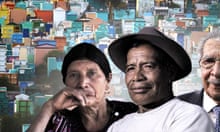A campaign for justice dating back to Latin America's "dirty wars" suffered a setback on Monday when Guatemala's constitutional court overturned the genocide conviction against the former dictator José Efraín Ríos Montt.
The retired general was sentenced to 80 years in prison earlier this month for complicity in the deaths of 1,771 people of the Ixil Maya ethnic group during his period in power in 1982-83.
The earlier conviction by the three presiding judges was hailed as a breakthrough because it was the first time a former head of government was held responsible for killings in Guatemala.
But in the latest in a series of legal twists, the constitutional court has annulled all proceedings in the case that took place after 19 April, including concluding statements and the final judgment. It is unclear whether there will be a retrial.
Victims of the atrocities carried out in the 1980s fear the latest decision highlights the considerable influence retained by Ríos Montt, who was once feted by the US president Ronald Reagan as a "man of great personal integrity".
Ana Caba, an ethnic Ixil who survived the civil war after fleeing her home, was stunned by the decision.
"I'm distressed," she told Reuters. "I don't know what's happening. That's how this country is. The powerful people do what they want and we poor and indigenous are devalued. We don't get justice. Justice means nothing for us."
The former dictator has only served a couple of nights in prison. Soon after his conviction on 10 May, the 86-year-old complained of faintness and was transferred to an army hospital for respiratory and prostate tests.
Meanwhile, his supporters, including Guatemala's powerful business federation Cacif, lobbied successfully for the judgment to be overturned.
In a three-to-two decision by a five-judge panel, the constitutional court threw out the earlier ruling on the grounds that the case had been disrupted on 19 April. On that day the case was briefly suspended when two of the presiding judges clashed over the handling of the case. Ríos Montt was also temporarily left without a legal defence when his lawyer was expelled from the courtroom for several hours after accusing the presiding judge of bias. The constitutional court said the lawyer's request to recuse the judge was not sufficiently addressed.
At the very least, the latest decision resets the clock and is likely to allow Ríos Montt to return to house arrest. The attorney general's office is expected to appeal against the ruling.
Amnesty International described the decision as a "devastating blow for the victims of the serious human rights violations committed during the conflict" in Guatemala.
An estimated 200,000 people – mostly indigenous Mayans – were killed and 45,000 others "disappeared" during the 36-year civil war. Among the most violent periods was Ríos Montt's 17 months in power.
In hearings before 19 April, the prosecutor, Orlando López, called on almost 100 witnesses to military atrocities. Of those, 94 had lost a family member, 83 had suffered arson attacks, 16 were sexually assaulted and seven were tortured. He said forensic experts had examined mass graves that showed many victims, including children, were killed in assassination-style shootings.
How that evidence will now be used has been thrown into question.
Numerous trials and tribunals have been held in Latin America in recent years to assess the crimes and punish the perpetrators of a series of bloody conflicts against suspected leftwing insurgents in the 1970s and 80s. Chile and Peru have established "memory museums" to reflect on the conflicts in their countries. Brazil has a truth commission that is examining official records on murder and torture during its 1964-85 dictatorship. Argentina has annulled amnesties and tried several prominent members of the junta who set up internment camps, tortured political prisoners and dumped bodies in the Atlantic.
Even compared with these cases and others in Nicaragua, Honduras and elsewhere, Michael Shifter, president of the Inter-American Dialogue, a Washington-based thinktank, has described the killings in Guatemala as "off the charts".



